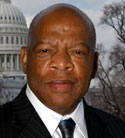Voter empowerment vs. voter suppression
By Nisa Islam Muhammad -Staff Writer- | Last updated: Jun 5, 2012 - 12:57:27 PMWhat's your opinion on this article?

Rep. John Lewis (D-Ga.)
|
“I’d be very surprised if this legislation gets passed,” Dr. Wilmer Leon, a political science professor at Howard University told The Final Call. “The Democrats don’t have a majority in the House. Voter empowerment is not something the Republicans are interested in. They are the ones doing things to suppress voters. They are not doing anything to empower voters.”
Rep. Lewis, along with House Democratic Whip Steny H. Hoyer of Maryland, Democratic Assistant Leader James Clyburn of South Carolina, Rep. John Conyers of Michigan, and Rep. Robert Brady of Pennsylvania, introduced the Voter Empowerment Act on May 17.
Authors say the bill would modernize voter registration, ensure equal access to the ballot box for all Americans, and prohibit deceptive practices and voter fraud that keep people from exercising their constitutional right to vote.
“The ability to vote should be easy, accessible and simple. Yet there are practices and laws in place that make it harder to vote today than it was even one year ago. The sponsors of this act believe we need to take action or risk losing the liberties we have enjoyed. We should be moving toward a more inclusive democracy, not one that locks people out,” said Rep. Lewis.
Inclusive democracy does not seem to be on the Republican to do list, according to Dr. Leon.
“The Tea Party is holding sway over the Republican Party. Anything that has more government involvement won’t pass their laugh test. This bill even wants to restore voting rights to those who were formerly incarcerated. That’s a huge issue for the Republican/Conservatives because those people would overwhelmingly vote Democratic.”
While the bill may not become law on the federal level, similar legislation may have a greater chance of survival on the local level.
Under the 2002 Help America Vote Act, states have put in place computerized voter rolls. But residents still must fill out paperwork to get onto those lists, and they fall off the rolls when there are errors, or when they move or change their address.
The voter modernization legislation requires the use of digital technology to pass names of eligible voters from state agencies on to election officials. People would be able to register or update their registration online or at the polls.
At least 21 states including California, Maryland and Georgia have automated voter registration at department of motor vehicle offices, a step supported by state officials from both parties. Those states have experienced increases in accuracy and registration rates, minimized potential fraud, and saved money.
State Sen. Michael Gianaris, the co-sponsor of legislation that would modernize New York’s voter registration system, said his bill, “will make it easier for people to vote.” He plans to introduce the bill by early June and, if adopted, it would take effect in 2013.
Speaking on a May 22 New America Media-hosted teleconference with ethnic media, Wendy Weiser, director of the Democracy Program at the Brennan Center, said federal legislation which contains many of the key provisions of the New York bill, shows Democratic leaders are “serious about voting reforms” and comes at a time when “we’ve witnessed the largest rollback of voting rights in a decade.”
Fourteen states passed restrictive voting laws that went into effect this year. In Georgia early voting was reduced from 45 days to 21 days. These restrictions have the potential to impact the 2012 election (Florida, Georgia, Illinois, Iowa, Kansas, Mississippi, Pennsylvania, South Carolina, South Dakota, Tennessee, Texas, Virginia, Wisconsin, and West Virginia) in states that account for 192 electoral votes, or 70 percent, of the total needed to win the presidency.
“Modernizing our voter registration system could add more than 50 million eligible voters to the rolls,” Ms. Weiser said, adding that, according to a Pew Center on states study, voting registration records of an estimated 24 million Americans contain inaccuracies.
“Illegible handwriting, applications lost in the mail, duplicative data entry, and typos,” Ms. Weiser said, citing problems pushing a growing number of states to shift to paperless, computer-based record keeping systems.
But why propose federal legislation that has little chance of seeing the light of day?
“This type of legislation needs to be proposed,” said Dr. Leon. “It addresses major issues of the day. Since the 1950s the Democrats have championed voter rights. This bill exposes the Republicans as hypocrites because of their incredible efforts to suppress voters.”
“The question is can the Democrats create a groundswell of interest and support so people will know about this bill. There was no national news about it last week. This is what Newark Mayor Corey Booker should have been talking about on Meet the Press. This legislation is a good idea but the Democrats seem unable to develop a marketing plan so the public knows about its relevance.”
He added, “That fact that Congressman Lewis has to do this shows how far behind the eight ball we are.”
Related news:
Groups mobilize to counter assault on voters’ rights (FCN, 06-05-2012)
INSIDE STORIES AND REVIEWS
-
-
About Harriett ... and the Negro Hollywood Road Show
By Rabiah Muhammad, Guest Columnist » Full Story -
Skepticism greets Jay-Z, NFL talk of inspiring change
By Bryan 18X Crawford and Richard B. Muhammad The Final Call Newspaper @TheFinalCall » Full Story -
The painful problem of Black girls and suicide
By Charlene Muhammad -National Correspondent- » Full Story -
Exploitation of Innocence - Report: Perceptions, policies hurting Black girls
By Charlene Muhammad -National Correspondent- » Full Story -
Big Ballin: Big ideas fuel a father’s Big Baller Brand and brash business sense
By Bryan Crawford -Contributing Writer- » Full Story






 Click Here Stay Connected!
Click Here Stay Connected!








